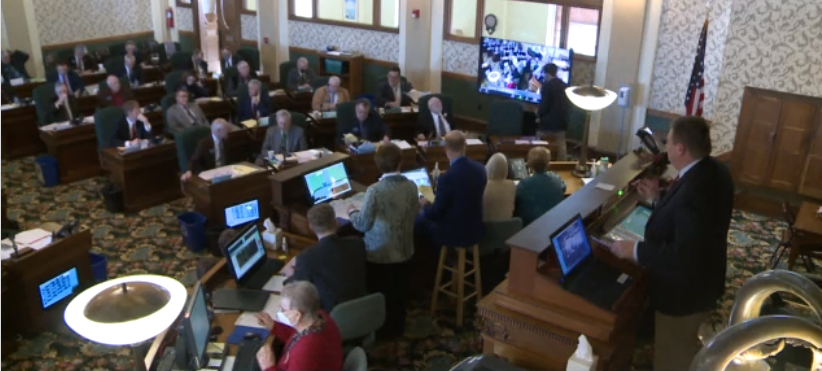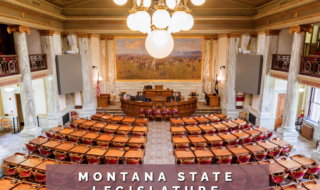January 24, 2021
COVID Liability Protection Bill Passes Senate—Computer Glitch Slows Legislative Pace
We have learned that the new bill-drafting software has been giving the staff trouble, thus bills are coming out a bit slower this session. Legislative leadership has decided not to hold session on Saturdays for the next three weeks to give everyone time to catch up. This will move the transmittal break from the last few days of February into March.
The Week in Review
- SB 65 Revise Civil Liability Laws – the bill to protect businesses from COVID liability claims – This bill passed the Senate on a 37 to 13 vote. The rules were suspended to hold both second- and third-reading votes on the same day, moving the measure quickly to the House. The House Business & Labor heard the bill on Friday. This is the bill Gov. Greg Gianforte requested to protect Montana businesses from frivolous lawsuits concerning COVID claims. NFIB is supporting this legislation.
- HB 125 Provide Exemption from Income Tax Withholding – this would have allowed an employee who thought they would owe no Montana income taxes to not have anything withheld from their paycheck. The bill was TABLED in House Tax.
- SB 91 Require Fiscal Note to Include Business Impact – This bill has come in prior sessions. Although there is merit in the concept, it becomes difficult to determine what information businesses would be asked to provide. A law change can have very different impacts on a large corporate chain than it does on a small, Main Street business. Even geography can make a difference, as a business in Billings and a business in Fairfield may not agree on the impacts of a particular piece of legislation. The committee has taken no action on this bill.
- HB 149 Allow certain card transaction fees – This bill has a proposed amendment so that it only applies to collection companies that have no other way to recoup the cost of credit transactions. The testimony indicated that they had not intended it to be used by all businesses in MT. In the end, the committee TABLED this bill.
- HB 158 – Create Study Commission to review COVID-19 statute and rule suspensions – The sponsor wants a committee to look at all the rules that were suspended due to the pandemic and determine if they really need to be in place at all. There is some dispute as to the cost of this study, and the committee has not yet acted on the bill.
The Week Ahead
- Tuesday, January 26, 9 a.m., Senate Business, Labor, and Economic Affairs Committee
SB 118 would revise laws relating to false statements to employers as they relate to workers’ compensation. This bill says that if a new employee lies about existing health conditions that are relevant for the work they are being hired for, you and your workers’ compensation policy will not be liable for benefits. As you likely know, once you have made a conditional offer for employment, you are allowed to screen for existing health issues that would prohibit them from doing the work for which they are being hired. If they provide false information and then attempt to collect for an injury, the claim will be denied. NFIB supports this legislation.
- Tuesday, January 26, 9 a.m., Senate Judiciary Committee
SB 132 would require accommodations to employer-mandated vaccinations to be uniformly offered. The bill states that if an employer requires vaccinations but offers religious or health exemptions, the employer must allow those exemptions for all employees regardless of religion or health. Monitor only.
- Wednesday, January 27, 8:30 a.m., House Business and Labor Committee
HB 198 would revise the workers’ comp death benefit law. Currently, if an employee dies on the job, workers’ compensation pays for the funeral costs up to $4,000. Because this does not cover the average cost, this bill would increase that to “up to $10,000” and adjust it for inflation in the future. The Montana State Fund has indicated that HB 198 will be such a minor increase, it will not affect the rates.
Bills to Watch
- HB 228 Establish family medical leave insurance – This is identical to the bill that was brought forward last session. It would require employers to pay a 1% payroll tax into a new fund that would then pay benefits for family and medical leave. However, those payments are not guaranteed to the employee and would only be paid out until the fund ran out of money. The allowable uses of the funds are extensive, and it would likely grow in cost to the employer. NFIB will again oppose this added cost to small-business owners.
- HB 187 Provide for local option sales tax. This has been referred to the House Taxation Committee but has no hearing date. NFIB members have indicated their opposition to all local option sales tax proposals.
Previous Reports and Related News
 Photo snip courtesy of the Montana Public Affairs Network
Photo snip courtesy of the Montana Public Affairs Network
NFIB is a member-driven organization advocating on behalf of small and independent businesses nationwide.
Related Articles

















